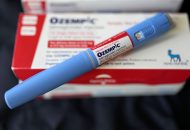By Tweaking the IRA, This Legislation Could Save Lives
COMMENTARY

The impact of the Inflation Reduction Act on the price of medicine is starting to play out. Measures to cap the price of insulin at $35 a month for Medicare enrollees took effect on Jan. 1.
In 2025, the IRA will cap annual out-of-pocket prescription drug costs for these enrollees at $2,000. These measures will result in substantial savings for American patients.
But for all the good the IRA is doing, it’s causing serious unintended consequences.
In particular, one provision steers research dollars away from some medicines and towards others, a process that should be driven by science and the needs of patients, not bureaucratic fiat.
Medicines can be divided into two very broad categories.
Those taken as pills, capsules or tablets are known as “small-molecule drugs,” and make up 90% of all drugs sold in the United States. They include everything from over-the-counter painkillers to treatments for diabetes and cancer. For the half of all Americans who live with a chronic medical condition, small-molecule drugs are a critical form of treatment. They’re convenient, private and make it easy to stick to a prescription.
Biologics, which make up the remaining 10% of drugs sold, are complex medicines made from living cells. While revolutionary for certain conditions, they require injections or infusions under medical supervision, which can make them more difficult to take.
As part of the effort to lower the cost of prescription drugs, the IRA grants Medicare the authority to set prices on certain medicines. Very sensibly, new drugs are given a grace period before they become eligible for price negotiation. This gives life-science companies — which typically spend many years and upwards of $2 billion to develop a treatment — a window to recoup their investment.
Oddly, though, the law protects biologics from price controls for 13 years — and gives small-molecule drugs a shorter, nine-year exemption. This four-year difference means small-molecule drugs are much less likely to deliver a return before price negotiations kick in.
Since the IRA was passed, venture capital investment in health care has dropped significantly — which already makes it more challenging to find cures. And as a result of the small-molecule penalty, drug companies have started to prioritize research on biologics over small molecules.
That could hurt patients.
Chances are that if you’re managing a chronic condition, a small-molecule drug is improving your life. These medicines include common drugs for diabetes, hypertension, high cholesterol and depression. They enable elderly patients, rural Americans, low-income families and other underserved populations to treat chronic diseases without frequent trips to the doctor or hospital. The pill penalty shifts investment to costly, complex treatments when small-molecule drugs are just as crucial, and in some cases more so, for Americans managing chronic conditions.
Moreover, the latest studies suggest that small-molecule drugs may be better than biologics at crossing the blood-brain barrier. That makes them important for treating Alzheimer’s disease and other neurological conditions. If we drain investment away from small-molecule research, it will be harder for scientists to conduct this important work.
But most importantly, research choices should be driven by science, not an ill-thought-through legal provision.
Fortunately, a bipartisan bill before Congress, the EPIC Act, offers a straightforward solution. It would do away with the four-year gap by setting price-negotiation exemptions at 13 years for both small-molecule drugs and biologics.
For lawmakers, this is a chance to show that even in polarized times, good policy and common sense can prevail.
We owe it to patients to safeguard continued investment in small-molecule drugs.
Democrats and Republicans should come together to pass the EPIC Act without delay. If they don’t, they risk undermining a core purpose of the IRA: expanding affordable access to vital medicines.
Kenneth E. Thorpe, PhD, is chair of the Department of Health Policy and Management at the Rollins School of Public Health, Emory University. He is also chairman of the Partnership to Fight Chronic Disease. The partnership can be reached on X.

























